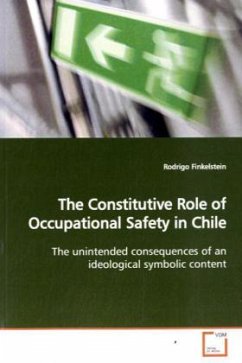The Constitutive Role of Occupational Safety in
Chile. Based on a non-technological perspective of
mass communication, which conceives modern social
practices as relevant disseminators of massive
symbolic content, this book examines the social
practice of occupational safety carried out in Chile
by the Mutual Accidents Insurance Associations
(Mutuals). Following a constructivist and critical
approach, this study explores the Mutuals symbolic
content in its constitutive function of shaping
occupational safety at the work site and its
unintended consequences upon workers safety and
health. Findings suggest Mutuals symbolic content
deprive workers safety and health by: a) excluding
risk strategies round productive processes, b)
subordinating safety decisions to the power of
capital, c) predominantly targeting safety
interventions to the workers psyche, d) denying
workers participation in safety administration
decisions, e) diminishing workers sense of value,
f) rejecting social organization of the labor
process as an objective for safety strategies and g)
facilitating occupational safety services to operate
as a system of control.
Chile. Based on a non-technological perspective of
mass communication, which conceives modern social
practices as relevant disseminators of massive
symbolic content, this book examines the social
practice of occupational safety carried out in Chile
by the Mutual Accidents Insurance Associations
(Mutuals). Following a constructivist and critical
approach, this study explores the Mutuals symbolic
content in its constitutive function of shaping
occupational safety at the work site and its
unintended consequences upon workers safety and
health. Findings suggest Mutuals symbolic content
deprive workers safety and health by: a) excluding
risk strategies round productive processes, b)
subordinating safety decisions to the power of
capital, c) predominantly targeting safety
interventions to the workers psyche, d) denying
workers participation in safety administration
decisions, e) diminishing workers sense of value,
f) rejecting social organization of the labor
process as an objective for safety strategies and g)
facilitating occupational safety services to operate
as a system of control.








